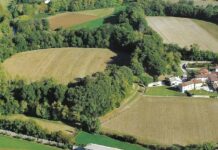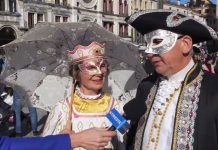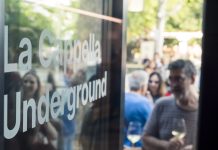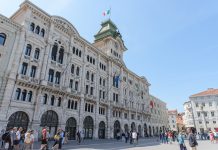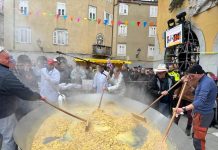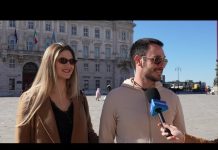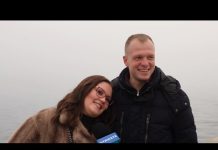by Maximiliano Crocamo
Interview: Maurizio De Blasio, Trieste councilor for Family and Education; Massimo Sgambati, president of Storigrafica APS
The sixth edition of Un Mare di Archeologia, an archeo-historical festival that blends education, art, and science, was presented Thursday morning at Trieste’s City Hall. Scheduled for October 23–26 in Piazza della Borsa, the event has become one of the city’s most innovative cultural fixtures, bringing archaeology to life for students, scholars, and the public.
Organized by the Società Friulana di Archeologia ODV – Sezione Giuliana, in collaboration with Storigrafica APS and Associazione Musica Libera, and co-organized by the City of Trieste with support from the Friuli Venezia Giulia Region, the festival enjoys backing from several local foundations and cooperatives, including Fondazione CRTrieste, Fondazione Casali, and Zadružna Kraška Banka.
Deputy Mayor Serena Tonel emphasized the city’s commitment to scientific outreach and lifelong learning. “Trieste has joined UNESCO’s list of Learning Cities, promoting shared knowledge across disciplines,” she said. “Un Mare di Archeologia fits perfectly into this strategy. It’s about building cultural and educational tourism for all who visit our city.”
Maurizio De Blasio, Councillor for Education and Family Policies, echoed that view, highlighting the festival’s educational mission. “This event allows young people to explore knowledge in a hands-on way,” he said. “It’s not just about learning history but discovering how it connects to the future.”
A Living Classroom
The festival’s guiding principle is to make history tangible and participatory. Particular attention is given to schools, with educational sessions and workshops held on October 23 and 24 from 8:30 a.m. to 1:30 p.m. Students can explore archaeology through interactive exhibits, creative laboratories, and demonstrations that merge tradition and technology—from experimental archaeology to 3D printing and marine exploration.
High school students from local institutions, including the Nautical Institute “Tomaso di Savoia Duca di Genova – Galvani,” the “Deledda–Fabiani” Technical Institute, and the “Enrico e Umberto Nordio” Art High School, will play an active role by leading workshops for younger participants. The peer-to-peer format is designed to transform students into teachers, sharing their curiosity and expertise in a collaborative learning environment.
Global Perspectives and Hands-On Discovery
The festival’s program also includes a wide range of workshops—from ancient calligraphy and typography to engraving, maritime professions, and historical board games. A notable addition this year is a collaboration with the South Korean Delegation, which will offer a workshop on Korean art and history, including fan decoration, woodblock printing, and Hangeul calligraphy.
Throughout the four days, the festival will feature conferences, performances, and interactive events in the Piazza della Borsa pavilion (open Thursday and Friday from 3 p.m. to 8 p.m., Saturday from 9 a.m. to 1 p.m. and 3 p.m. to 8 p.m., and Sunday from 9 a.m. to 2 p.m.).
Highlights and Guest Speakers
The festival will open on October 23 at 6 p.m. at the Salone degli Incanti with art historian Virtus Zallot’s talk Un Medioevo di Abbracci (“A Medieval Age of Embraces”), a poetic exploration of gestures of welcome and connection in medieval art and literature.
On October 24, archaeologist Alessandro D’Alessio, Director of the Archaeological Park of Ostia Antica, will present recent findings on the ancient Jewish community of Ostia, including the discovery of a rare Roman-era mikveh — the only one of its kind outside Israel.
Saturday, October 25, features the Serata dell’Archeologia (Archaeology Evening) in Piazza della Borsa. Events include a preview of In Antrum, a film exploring the caves of the Karst as places of memory and myth, and an interactive lecture on Egyptian hieroglyphs by Egyptologist Pasquale Barile. The evening concludes with Vinse di mille secoli il silenzio, a theatrical performance by Compagnia della Pietra honoring Heinrich Schliemann, the pioneer of modern archaeology.
A Community of Curiosity
The festival will close on Sunday, October 26, with a Historical Treasure Hunt through Trieste’s neighborhoods and Sblocca la Storia, an afternoon of history-themed board games created in collaboration with local associations.
More than a cultural event, Un Mare di Archeologia serves as a civic laboratory — a space where education, science, and creativity converge. It invites visitors to rediscover history as a shared experience that continues to shape the present.
The full program is available at www.marearcheologia.it.
For information, contact +39 340 081 3203 or email info@marearcheologia.it.




